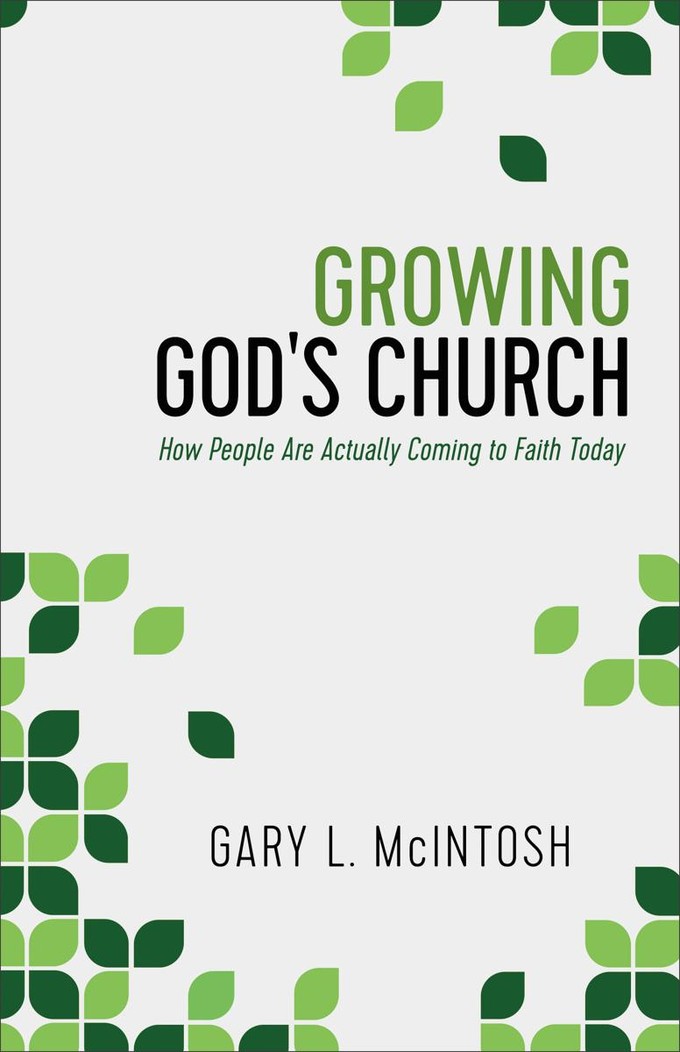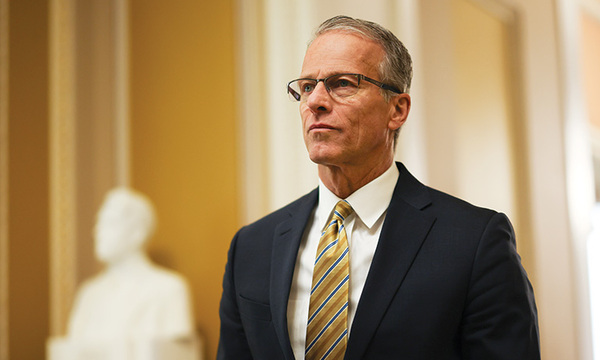
One of the church’s primary purposes is to make disciples. But how are new disciples actually being made today? Which methods are most effective in reaching people with the gospel?
Those are some of the questions that church growth expert and ČŐČŐĹöşÝşÝÔęľĂľĂÔę2023 professor Gary L. McIntosh sets out to answer in his most recent book, Growing God’s Church: How People Are Actually Coming to Faith Today. Based on a statistically valid study that McIntosh developed with former Talbot professor and alumnus Michael Anthony (’75, M.A. ’76), the book offers practical advice — and a few surprises — as it examines the survey responses of nearly 1,100 Christians over nearly a 10-year period about why and how they committed their lives to Christ.
ČŐČŐĹöşÝşÝÔęľĂľĂÔę2023 Magazine recently sat down with McIntosh to discuss the research and what it means for churches.
Gary, the subtitle of your book is “How People are Actually Coming to Faith Today.” What were some of the most significant findings from your research about how people are coming to faith today?
Family and friends are still the main reason people come to Christ, but it is lower than it used to be. Back in the late 1970s, researcher Win Arn found that 85 to 90 percent of people reported coming to Christ through family and friends. My research found that closer to 60 percent of people were saying family and friends. I think that’s a reflection of our mobile society. People move so much. When Arn did the study back in the ’70s, people still lived closer to family and lived in their homes longer, and therefore they probably established closer friendships than maybe we even have today. But now we’re in an era when about 20 percent of people move every year. They may move across town or out of the state or around the world, but they move. The mobility of our society destroys the natural networks of family and friends.

As the influence of family and friends has gone down, what has moved up to replace them?
In the study it was church staff. About 60 percent of people said family and friends, but about 17 percent said a staff member led them to faith in Christ — staff being not just ordained pastors, but secretaries, interns, Sunday school superintendents, small group directors and others. And then 11 percent of people said it was someone other than family, friends or a staff member.
So, the research indicates that people are coming to church before they come to Christ — that the church is playing a part in their conversion process.
Right, and I think part of that has to do with the fact that a lot of people are coming to church today without a personal invitation. Historically, people were brought to church primarily by family members. That’s still a pretty high number, no doubt. But 25 percent of people indicated no one influenced them to attend church. So, you know, we’re talking about a fourth of people who are saying, “I found the church on my own.” This, by the way, makes “connecting ministries” more important in churches. Usually, in the past, if you were brought by a family member or a friend, they led you through the maze of the new church. But now, if people just show up, and they have no one to take them by the hand and lead them through that connecting time, it becomes even more important for churches to have a well-designed connecting ministry.
We’ve talked about the people who were involved in leading others to faith, but I know you researched methods as well. Were you at all surprised by the effectiveness or ineffectiveness of certain methods?
Yes. Historically, people would often say that they were led to Christ through a methodology like the Four Spiritual Laws or the Romans Road or Evangelism Explosion. They would think in terms of some sort of rote presentation of Scripture that led people along to see that they were sinners and that they needed to pray in order to receive Christ. We found absolutely none of that, which was sort of a surprise — that there is no clear, single methodology in the sense of a process to lead people to faith in Christ like maybe there would have been 50 years ago or even 30 years ago.
Instead, people said that it was simply conversation; they just had a spiritual conversation with a family member or friend or staff member. It seems as though people are coming to faith through natural conversations and discussions. People don’t want to feel that they’re being led through some sort of a rote presentation. They want to feel that it’s more natural—that we’re just talking among friends, about life and sports and spiritual things. And through that conversation they come to understand what Christianity is and what commitment to Christ is, and some people just all of a sudden say, “I believe.” It’s not that they necessarily pray a particular prayer or something. Some do, but at times they just say, “I’ve thought about this, we’ve talked about this, and I’ve come to believe it.” So it is a process toward faith, but it happens more in just a normal conversation.
At the same time, you encourage people not just to leave it at dialogue, but to steer people toward a verdict, even in a more organic kind of conversation.
Yes, it’s an organic conversation, but at the same time, people do have to be steered toward a point of decision. They have to realize, “I have to make a choice here.” Therefore, I still think it’s good to train people in churches to share their faith, and when we train them we probably do need a sort of memorized system. I do think most Christians need some sort of thought process in their mind — “This is the order I want to discuss things” or “This is what I want to bring up to talk about.” But it’s not such a rote presentation.
You spend a portion of the book talking about the significant decline you’ve seen in evangelism, even since the ’90s. It’s your educated guess that 90 percent of people are reluctant to engage in evangelism. Why do you think there’s been such a dramatic decline?
For one, it’s just the shift of our culture. As we all know, we’re more postmodern today. There’s more of a variety of religions in the United States than there used to be. Not only that, but as our world has become more secularized, a lot of people don’t feel they have any kind of faith. So I think it’s a more difficult time to share our faith because we can’t assume the same understandings, the same foundations. For example, Campus Crusade developed the Four Spiritual Laws in the 1950s, which begins with “God loves you and has a wonderful plan for your life.” Well, in the 1950s, most people believed in God. They may not have known a whole lot about God, but at least they believed in God. So that was a great beginning. But now, if you use that with a person on a college campus, they may say, “God? What are you talking about? I don’t even believe in God.” That means we need to begin at a different starting point with them. And I think a lot of church people don’t feel comfortable with that.
I also think our society has become somewhat anti-Christian — certainly anti-proselytizing. You’re dealing with a kind of hostility, and I think our people just pull back. They’d like to share their faith, but they’d like to do it in a warm environment, and most environments today aren’t so warm.
What steps would you recommend for individuals and churches who want to grow in the area of evangelism?
I suggest that they start with developing a consciousness in the church for the Great Commission, that we’re called to make disciples. And that means making new disciples, not just better old disciples. It also means focusing on the “going” aspect. We have to go out there and be a part of the culture, be a part of networks with people who are not Christians, build friendships where we can enter into spiritual conversations in a warm environment. I think that starts with the pastors and the leaders creating a consciousness that we’re here to fulfill the Great Commission.
Then I think a church does need to find some evangelism-training curriculum and they need to begin systematically training their adults. I suggest that a church target 10 percent of its adults and train them in what we typically call friendship evangelism, giving their people practical tools on how to enter into conversations and talk about Christ in a natural way. Train 10 percent of your adults every year and keep that up. Usually in about the fifth or sixth year, you really start to see some results, because at that point you have about half of your adults trained. It starts to change the culture of the church.
Now along with that, churches have to have events that are what you might call “halfway events.” Because when you’re talking about truly secular people, who have not been in the church in their memory, it’s a little bit scary to just come to church. Churches need to have events where non-Christians can come and experience a part of the church’s ministry and fellowship without having to come all the way to a worship service. I think it’s a combination of creating the consciousness, doing the training, and then providing these kinds of events where people can test out the church and see what kind of people we Christians are.
Gary L. McIntosh, professor of Christian ministry and leadership at ČŐČŐĹöşÝşÝÔęľĂľĂÔę2023’s Talbot School of Theology, is an internationally known church growth expert and author of 24 books, including Growing God’s Church: How People Are Actually Coming to Faith Today, released in January 2016 through Baker Books. He holds a Ph.D. and D.Min. from Fuller Theological Seminary.
 ČŐČŐĹöşÝşÝÔęľĂľĂÔę2023
ČŐČŐĹöşÝşÝÔęľĂľĂÔę2023


